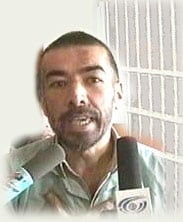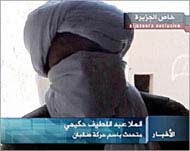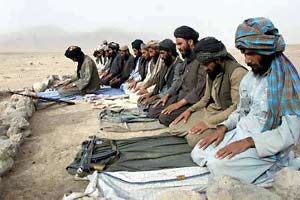Tags
Afghanistan
-
Remaining Korean Hostages Released

As of last Thursday, August 30, the last of the nineteen hostages held by the Taliban were released. Upon returning home, a medical examiner reported that some male hostages had been beaten by their captors. Apparently they had been beaten for refusing to take part in Islamic prayers or to convert to Islam and for protecting female captives. Two of them, Je Chang-Hee and Song Byung-Woo, were beaten or threatened with death when they refused to move out of a dugout shelter and leave some of their female colleagues behind. They have reportedly fully recuperated from the attacks.
On Monday, South Korean President Roh Moo-Hyun ordered the former captives to repay some of the costs of their rescue. Public rejoicing at the release of the hostages has shifted to criticism and anger at the Saemmul Community Church for sending the team of volunteers into a hostile Muslim country.
Pray that these ex-hostages will fully recuperate from their ordeal. Pray for the leadership of the Saemmul Community Church as they face public hostility. Pray that the threats by the Taliban to kidnap others will come to nothing.
For more information on the difficulties facing Christianity in Afghanistan, click here. Check out Glenn Penner's blogs on the fallout of the concessions made by the South Korean government to secure the release of the hostages.
-
South Korean Hostages being Released

On August 28, South Korean officials and the Taliban announced an agreement to free the remaining Christian missionaries who have been held hostage by the Taliban since July 19 (click here for more details). The Voice of the Martyrs has learned that, as of the morning of August 29, at least twelve of the hostages have already been released.
In exchange for the release of their citizens, South Korea reportedly agreed to follow through on their plans to withdraw their troops from Afghanistan by the end of the year. The officials also agreed to prevent South Koreans from engaging in missionary activity in Afghanistan. Since South Korea was already planning to withdraw their troops by the end of 2007, the deal indicates the kidnapping may have been more religiously-motivated than originally reported.
Glenn Penner, CEO for The Voice of the Martyrs responded to the agreement by expressing his organization's deep concerns over this last condition: "Ultimately, it seems that the only real concession that the South Korean government was prepared to publicly make was the religious freedom of its own citizens. Make no mistake, this decision to withdraw missionaries from Afghanistan and to prevent others from going there is a violation of religious freedom. It is telling Korean Christians, 'You can obey Christ's commission but not in Afghanistan.' This no government has the right to do, even in the name of protecting their citizens. We are also concerned that this concession by the South Korean government could further endanger the safety of Christian missionaries of all nationalities in other countries like Afghanistan where Christianity is viewed with hostility. Religiously motivated militants may conclude, having seen the Taliban successfully drive out South Korean missionaries in this manner, that kidnapping missionaries in the hopes of negotiating similar concessions by other governments concerned over the safety of its citizens is a legitimate and potentially successful strategy.
The Voice of the Martyrs urges governments to refrain, even with the best intentions, from interfering in rights of its citizens to carry out their faith even in dangerous environments and we urge Christians in free nations to recognize that there are risks in taking the gospel to many parts of the world and to accept the consequences of their obedience. This is biblical Christianity at work and we should not be surprised by it. God does not lead us only to safe places."
Praise God for those who have been released. Pray that the remaining Christians will be released. Pray for the family and friends of those hostages who were killed. Pray that South Korean Christians will be emboldened to carry on their service to Christ wherever God leads them.
For more information on the persecution facing Christians in Afghanistan, click here. Glenn Penner has written a biblical theology of persecution and discipleship that provides the framework for his comments above. To order a copy of "In the Shadow of the Cross," click here.
-
Second Korean Hostage Killed
 Last week, the Persecution & Prayer Alert reported on the death of one of the Korean Christian hostages in Afghanistan (click here for more). He has since been identified as Bae Hyung-kyu, a youth pastor from Saemmul Community Church, a Presbyterian church in Bundang, South Korea of which the twenty-three captives are members. Apparently he was the leader of the team.
Last week, the Persecution & Prayer Alert reported on the death of one of the Korean Christian hostages in Afghanistan (click here for more). He has since been identified as Bae Hyung-kyu, a youth pastor from Saemmul Community Church, a Presbyterian church in Bundang, South Korea of which the twenty-three captives are members. Apparently he was the leader of the team.In the early morning of July 31, Afghan officials found the body of a second slain captive, Shim Sung-min (29). A Taliban spokesman said that he was killed because the Afghan government had not released insurgents captured on July 19. They are threatening to kill the remaining hostages if their demands are not met.

Continue to pray for the hostages and their families. Pray for those grieving the loss of their loved ones. Pray for safety for other Christians in Afghanistan, including aid workers who endeavour to help the suffering of the Afghan people.
For more information on the difficulties facing Christians in Afghanistan, click here.
-
Taliban Kills Korean Hostage
The Voice of the Martyrs has learned that the Taliban has killed one of the twenty-three Korean Christian hostages they have been holding hostage since last week. Reuters is reporting that the Taliban have expressed frustration over the fact that three deadlines passed without their demands being met and have threatened to kill more of the hostages.
South Korean Christians posing for a commemorative
photograph before leaving for Afghanistan on July 13.The twenty-three, including eighteen women, belong to the "Saemmul Church" in Bundang, a city outside South Korea's capital, Seoul. They were working at Korean Action, an aid organization in Kandahar. Most of the Koreans are in their 20s and 30s, and include nurses and English teachers.
Since the kidnapping, South Korea has banned its citizens from traveling to Afghanistan.
Please pray for a peaceful resolution to this crisis. Pray for the safety of the hostages and pray for their loved ones at home in Korea.
For more information on the difficulties facing Christians in Afghanistan, click here.
-
Christian Freed But No Change to Laws
 After intense international pressure, the Afghan courts have dropped all charges against a convert to Christianity, Abdul Rahman. The judge said there is a lack of evidence against him. However, Islamic leaders continue to call for his death. Following the court decision, Rahman was protected in an undisclosed location in Kabul while a safe country was found for him to live. Despite a vote from Afghanistan 's parliament earlier today demanding that Rahman stay in the country, he arrived in Italy today at the invitation of the Italian government.
After intense international pressure, the Afghan courts have dropped all charges against a convert to Christianity, Abdul Rahman. The judge said there is a lack of evidence against him. However, Islamic leaders continue to call for his death. Following the court decision, Rahman was protected in an undisclosed location in Kabul while a safe country was found for him to live. Despite a vote from Afghanistan 's parliament earlier today demanding that Rahman stay in the country, he arrived in Italy today at the invitation of the Italian government.While international attention has centered on Rahman's specific case, the constitutional law under which he was arrested has not changed. It remains illegal for Afghans to convert from Islam. Those who convert face the death penalty.
On March 22, Compass Direct reported on the arrest of two other Afghan Christians. The names and locations of these converts remain confidential for their safety. Other Christians have recently been beaten, threatened and subjected to police raids.
While VOMC is thankful that the life of Rahman has been saved, we urge Christians to continue to pray for Afghanistan 's Christians and urge government leaders to pressure the Afghan government to change the laws restricting religious freedoms in this tumultuous country. For assistance in writing letters, click here. Government contact information is available through links through our links page.
Pray that Rahmad will maintain a heart of forgiveness for those who have persecuted him. Pray that he will find continued opportunities to share his faith with others wherever he lives. Pray that Christians who remain within Afghan prison walls because of their love for Christ will also be released soon. Pray that the government of Afghanistan will honour individuals' religious rights, including the right to convert.
For more information on the persecution of Christians in Afghanistan ,click here.
-
Convert Faces Possible Death Sentence
 As troops from around the world, including Canada, seek to defend the freedoms of Afghanistan's citizens, one of those citizens could be facing the death penalty for rejecting Islam. Sixteen years ago, Abdul Rahman converted from Islam to Christianity while working in Pakistan. Rahman (41) is separated from his wife. He was arrested last month after his family, who is fighting him over custody of his children, denounced him for being a convert. He was found with a Bible when arrested and accused of rejecting Islam.
As troops from around the world, including Canada, seek to defend the freedoms of Afghanistan's citizens, one of those citizens could be facing the death penalty for rejecting Islam. Sixteen years ago, Abdul Rahman converted from Islam to Christianity while working in Pakistan. Rahman (41) is separated from his wife. He was arrested last month after his family, who is fighting him over custody of his children, denounced him for being a convert. He was found with a Bible when arrested and accused of rejecting Islam. The prosecutor, Abdul Wasi, is seeking the death penalty. He has offered to drop all charges if Rahman would return to Islam but the offer has been refused. Judge Ansarullah Mawlavezada has called Rahman's conversion to Christianity "an attack on Islam." "If he doesn't regret his conversion, the punishment will be enforced on him," the judge said. "And the punishment is death." The verdict will be handed down within two months. Rahman is not represented by a lawyer and has no support from his family.
In an open letter to Canadian Prime Minister Harper, VOMC spokesman Glenn Penner wrote, "That this man is being prosecuted for exercising a basic human right is completely unacceptable and a violation of why we sent our troops to Afghanistan." Penner encourages Canadian Christians to contact the Prime Minister, asking him to pressure the Afghan president to respect the rights of all of the citizens of Afghanistan, including Christians.
Pray that the charges against Abdul will be dropped. Ask God to move the hearts of government leaders in free nations to use their influence to facilitate the release of Abdul. Pray that he will remain faithful in his witness for Christ. Pray that the Lord will use Abdul's testimony to create an interest in the claims of Jesus Christ in the lives of many in Afghanistan.
For more information on the persecution of Christians in Afghanistan,click here.
-
Taliban Cut Afghani Christian's Throat for Evangelizing
Taliban guerrillas in Afghanistan are claiming to have cut the throat of a Muslim cleric after they discovered he was propagating Christianity. Taliban spokesman Abdul Latif Hakimi phoned Reuters on July 1, saying they killed Maulawi Assadullah the previous day, saying that they "enough evidence and local accounts" to prove that Assadullah was involved in converting Muslims to Christianity. Hakimi claimed that a number of foreign aid agencies were likewise involved in spreading Christianity and would face a similar fate. "We warn them that they face the same destiny as Assadullah if they continue to seduce people," he said.
Hakimi on Al-Jezeera
 Pray for the family and friends grieving the death of Assadullah. Pray for protection and wisdom for aid workers in Afghanistan. Pray that the Good News of Jesus Christ will continue to spread, despite these warnings.
Pray for the family and friends grieving the death of Assadullah. Pray for protection and wisdom for aid workers in Afghanistan. Pray that the Good News of Jesus Christ will continue to spread, despite these warnings.For more information on persecution in Afghanistan,click here.
-
Proposed Constitution Omits Vital Freedoms
This morning, the United States Commission on International Religious Freedom (USCRIF) issued a press release expressing serious concerns about the proposed constitution for Afghanistan, which could be approved as early as December.
According to the report, also published in today's New York Times (http://www.nytimes.com/2003/10/01/opinion/01BANS.html), the proposed constitution would enshrine elements of Sharia law, including blasphemy, apostasy, and other religious crimes. When the USCIRF spoke with Afghanistan's chief justice, Fazl Hadi Shinwari, he told them that he accepted the Universal Declaration on Human Rights with three exceptions: freedom of expression, freedom of religion and equality of the sexes. He said that the Koran is "the only law." If this constitution is ratified by the loya jirga (grand council) in December, Islamic law could be used to suppress any dissenting thought or religious faiths other than Islam.
We encourage you to raise your concerns with your federal government officials, urging them to pressure the Afghani government to accept the entire Universal Declaration on Human Rights. For links, go to our links page. Pray that those drafting the constitution will listen to international concerns and institute the necessary changes before bringing it to a vote.
For more information on the persecution of Christians in Afghanistan, go to the Afghanistan Country Report.
-
Regime Change Does Not Guarantee Religious Liberty
Editorial by Glenn Penner (Communications Director)
Over the last week, I have been reading a number of articles on the effects of the regime changes in Afghanistan and Iraq as it impacts religious liberty, especially for Christians. Before I proceed any further, let me make it clear that, in principle, I personally support the overthrow of the Taliban and the Baathist government of Saddam Hussein. Both regimes were brutal in their suppression of basic human rights and the world (to say nothing of their countries) is a safer place with them out of power.
But we would be mistaken to think that simple regime change will automatically result in better conditions for Christian minorities in these states. In Afghanistan, for example, the Afghan Minister of Justice, Asharaf Rasooli stated categorically to CBN journalist, George Thomas last year, "No Muslim is allowed to convert to another religion. But if a person wants to convert to Islam, there is no problem with that." Mullah Fazul Shinwari, Afghanistan's Supreme Court Chief Justice, has warned that those found guilty in his courtroom of sharing the Gospel, could face the death penalty. While there have been no reports of actual public executions of converts to Christianity to date, VOM sources indicate that there have been converts killed in remote areas of the country. Yes, there is greater freedom in Afghanistan today than there was a couple of years ago, but the verdict is still out whether Afghanistan will be able to do what no other Islamic state has been capable of; allowing freedom of religion, including the right to convert from the majority religion. Frankly, I am doubtful.
My pessimism extends to the new Iraq emerging from the ruins of Saddam Hussein's former regime. Shiite Muslims are rightfully rejoicing over their newfound religious freedom, having been suppressed by Hussein during his rule. Speaking to a group of business reporters earlier this week, President Bush enthused, "I love the stories about people saying, 'Isn't it wonderful to be able to express our religion, the Shia religion, on a pilgrimage this weekend.' It made my day to read that." Unfortunately, this newfound freedom has been accompanied by calls for the establishment of an Islamic state by a number of Iraqi Shiites. This would most certainly bode ill for religious minorities like Christians. One need only look across the border to Shiite-dominated Iran to see how Bahais, Christians and other religious minorities fare under such a regime. Freedom House's Paul Marshall in an article in the National Review early last month stated quite correctly, "Unless the U.S. realizes the danger extreme sharia law would pose to Iraq, America could preside over a process of radical Islamization like that currently threatening Afghanistan's reconstruction. Instead of aiding Muslims who want genuine religious freedom and equality, we will help build reactionary regimes that, as recent experienceshows, are likely to become our enemies" (http://www.nationalreview.com/comment/comment-marshall030703.asp).
It is incumbent on those of us who live in liberal democracies to insist to our political leaders that, in their desire to help rebuild Iraq and Afghanistan, they not ignore the dangers that come with allowing these new regimes to integrate sharia law into their new constitutions. We have already imposed our will upon these countries by changing their regimes (either actively through military intervention, or passively by welcoming the overthrow of these regimes even if not actively involved). The time is past for our leaders to say that we must allow Iraqis free reign to now decide for themselves what kind of government to set up. If our governments allow sharia law to be constitutionally enshrined in Iraq and Afghanistan, we will likely be right back to where we started from in only a few years. In fact, in the case of Iraq, the Christian population (and other religious minorities) may very well be worse off than they were with Saddam as their leader. We face a unique opportunity in Iraq and Afghanistan today; the opportunity to assist in building societies that genuinely permit religious freedom. If we are going to help Iraq and Afghanistan to build more civil societies, we must recognize that sharia law is part of the original problem; it cannot be made part of the solution.

